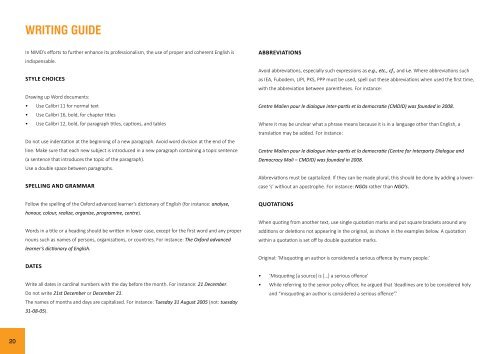NIMD Style Guidelines
You also want an ePaper? Increase the reach of your titles
YUMPU automatically turns print PDFs into web optimized ePapers that Google loves.
WRITING GUIDE<br />
In <strong>NIMD</strong>’s efforts to further enhance its professionalism, the use of proper and coherent English is<br />
indispensable.<br />
STYLE CHOICES<br />
Drawing up Word documents:<br />
• Use Calibri 11 for normal text<br />
• Use Calibri 16, bold, for chapter titles<br />
• Use Calibri 12, bold, for paragraph titles, captions, and tables<br />
Do not use indentation at the beginning of a new paragraph. Avoid word division at the end of the<br />
line. Make sure that each new subject is introduced in a new paragraph containing a topic sentence<br />
(a sentence that introduces the topic of the paragraph).<br />
Use a double space between paragraphs.<br />
SPELLING AND GRAMMAR<br />
ABBREVIATIONS<br />
Avoid abbreviations, especially such expressions as e.g., etc., cf., and i.e. Where abbreviations such<br />
as IEA, Fubodem, LIPI, PKS, PPP must be used, spell out these abbreviations when used the first time,<br />
with the abbreviation between parentheses. For instance:<br />
Centre Malien pour le dialogue inter-partis et la democratie (CMDID) was founded in 2008.<br />
Where it may be unclear what a phrase means because it is in a language other than English, a<br />
translation may be added. For instance:<br />
Centre Malien pour le dialogue inter-partis et la democratie (Centre for Interparty Dialogue and<br />
Democracy Mali – CMDID) was founded in 2008.<br />
Abbreviations must be capitalized. If they can be made plural, this should be done by adding a lowercase<br />
‘s’ without an apostrophe. For instance: NGOs rather than NGO’s.<br />
Follow the spelling of the Oxford advanced learner’s dictionary of English (for instance: analyse,<br />
honour, colour, realize, organize, programme, centre).<br />
Words in a title or a heading should be written in lower case, except for the first word and any proper<br />
nouns such as names of persons, organizations, or countries. For instance: The Oxford advanced<br />
learner’s dictionary of English.<br />
DATES<br />
Write all dates in cardinal numbers with the day before the month. For instance: 21 December.<br />
Do not write 21st December or December 21.<br />
The names of months and days are capitalized. For instance: Tuesday 31 August 2005 (not: tuesday<br />
31-08-05).<br />
QUOTATIONS<br />
When quoting from another text, use single quotation marks and put square brackets around any<br />
additions or deletions not appearing in the original, as shown in the examples below. A quotation<br />
within a quotation is set off by double quotation marks.<br />
Original: ‘Misquoting an author is considered a serious offence by many people.’<br />
• ‘Misquoting [a source] is […] a serious offence’<br />
• While referring to the senior policy officer, he argued that ‘deadlines are to be considered holy<br />
and “misquoting an author is considered a serious offence”.’<br />
20

















